 полная версия
полная версияThe American Revolution
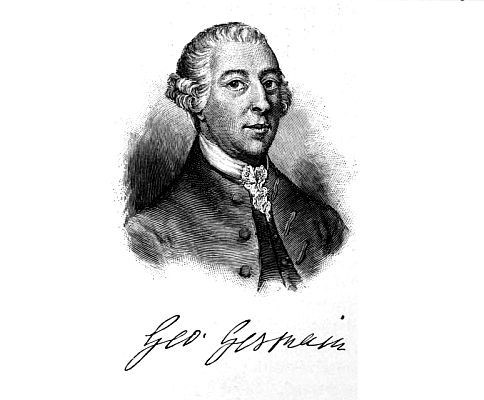
When the news of this affair reached England, it was quite naturally pronounced by Lord North a fitting culmination to years of riot and lawlessness. This, said Lord George Germain, is what comes of their wretched old town meetings. The Americans have really no government. These “are the proceedings of a tumultuous and riotous rabble, who ought, if they had the least prudence, to follow their mercantile employments, and not trouble themselves with politics and government, which they do not understand. Some gentlemen say, ‘Oh, don’t break their charter; don’t take away rights granted them by the predecessors of the Crown.’ Whoever wishes to preserve such charters, I wish him no worse than to govern such subjects.” “These remarks,” said Lord North, “are worthy of a great mind.” “If we take a determined stand now,” said Lord Mansfield, “Boston will submit, and all will end in victory without carnage.” “The town of Boston,” said Mr. Venn, “ought to be knocked about their ears and destroyed. You will never meet with proper obedience to the laws of this country until you have destroyed that nest of locusts.” General Gage, who had just come home on a visit, assured the king that the other colonies might speak fair words to Massachusetts, but would do nothing to help her; and he offered with four regiments to make a speedy end of the whole matter. “They will be lions,” said Gage, “while we are lambs; but if we take the resolute part, they will prove very meek, I promise you.” It was in this spirit and under the influence of these ideas that the ministry took up the business of dealing with the refractory colony of Massachusetts. Lord North proposed a series of five measures, which from the king’s point of view would serve, not only to heal the wounded pride of Great Britain, but also to prevent any more riotous outbreaks among this lawless American people. Just at this moment, the opposition ventured upon a bold stroke. Fox said truly that no plan for pacifying the colonies would be worth a rush unless the unconditional repeal of the Tea Act should form part of it. A bill for the repealing of the Tea Act was brought in by Fuller, and a lively debate ensued, in the course of which Edmund Burke made one of the weightiest speeches ever heard in the House of Commons; setting forth in all the wealth of his knowledge the extreme danger of the course upon which the ministry had entered, and showing how little good fruit was to be expected from a coercive policy, even if successful. Burke was ably supported by Fox, Conway, Barré, Savile, Dowdeswell, Pownall, and Dunning. But the current had set too strongly against conciliation. Lord North sounded the keynote of the whole British policy when he said, “To repeal the tea-duty would stamp us with timidity.” Come what might, it would never do for the Americans to get it into their heads that the government was not all-powerful. They must be humbled first, that they might be reasoned with afterwards. The tea-duty, accordingly, was not repealed, but Lord North’s five acts for the better regulation of American affairs were all passed by Parliament.
The Boston Port BillBy the first act, known as the Boston Port Bill, no ships were to be allowed to enter or clear the port of Boston until the rebellious town should have indemnified the East India Company for the loss of its tea, and should otherwise have made it appear to the king that it would hereafter show a spirit of submission. Marblehead was made a port of entry instead of Boston, and Salem was made the seat of government.
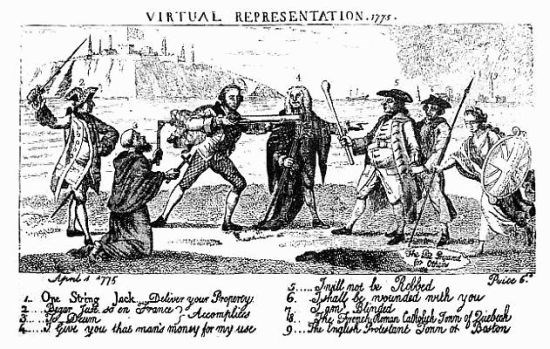
VIRTUAL REPRESENTATION. 1775.
The king’s friends were fond of asserting that the Americans were “virtually represented” in Parliament, through their British friends in that body. On the back of the copy of this broadside, “Virtual Representation,” in the possession of the Massachusetts Historical Society, is the following explanation, in the handwriting of the time: —
“A full explanation of the within print. – No. 1 intends the K – g of G. B., to whom the House of Commons (4) gives the Americans’ money for the use of that very H. of C., and which he is endeavouring to take away with the power of cannon. No. 2, by a Frenchman signifies the tyranny that is intended for America. No. 3, the figure of a Roman Catholic priest with his crucifix and gibbet, assisting George in enforcing his tyrannical system of civil and religious government. Nos. 5 and 6 are honest American yeomen, who oppose an oaken staff to G – ’s cannon, and determine they will not be robbed. No. 7 is poor Britannia blindfolded, falling into the bottomless pit which her infamous rulers have prepared for the Americans. Nos. 8, 9 represent Boston in flames and Quebec triumphant, to show the probable consequence of submission to the present wicked ministerial system, that popery and tyranny will triumph over true religion, virtue, and liberty.”
The Regulating ActBy the second act, known as the Regulating Act, the charter of Massachusetts was annulled without preliminary notice, and her free government was destroyed. Under the charter, the members of the council for each year were chosen in a convention consisting of the council of the preceding year and the assembly. Each councillor held office for a year, and was paid out of an appropriation made by the assembly. Now, hereafter, the members of the council were to be appointed by the governor on a royal writ of mandamus, their salaries were to be paid by the Crown, and they could be removed from office at the king’s pleasure. The governor was empowered to appoint all judges and officers of courts, and all such officers were to be paid by the king and to hold office during his pleasure. The governor and his dependent council could appoint sheriffs and remove them without assigning any reason, and these dependent sheriffs were to have the sole right of returning juries. But, worse than all, the town-meeting system of local self-government was ruthlessly swept away. Town meetings could indeed be held twice a year for the election of town officers, but no other business could be transacted in them. The effect of all these changes would, of course, be to concentrate all power in the hands of the governor, leaving no check whatever upon his arbitrary will. It would, in short, transform the commonwealth of Massachusetts into an absolute despotism, such as no Englishman had ever lived under in any age. And this tremendous act was to go into operation on the first day of the following June.
By the third act – a pet measure of George III., to which Lord North assented with great reluctance – it was provided that if any magistrate, soldier, or revenue officer in Massachusetts should be indicted for murder, he should be tried, not in Massachusetts, but in Great Britain.
The shooting of citizensThis measure – though doubtless unintentionally – served to encourage the soldiery in shooting down peaceful citizens, and it led by a natural sequence to the bloodshed on Lexington green. It was defended on the ground that in case of any chance affray between soldiers and citizens, it would not be possible for the soldiers to obtain a fair trial in Massachusetts. Less than four years had elapsed since Preston’s men had been so readily acquitted of murder after the shooting in King Street, but such facts were of no avail now. The momentous bill passed in the House of Commons by a vote of more than four to one, in spite of Colonel Barré’s ominous warnings.
By the fourth act all legal obstacles to the quartering of troops in Boston or any other town in Massachusetts were swept away.
The Quebec ActBy the fifth act, known as the Quebec Act, the free exercise of the Catholic religion was sanctioned throughout Canada, – a very judicious measure of religious toleration, which concerned the other colonies but little, however it might in some cases offend their prejudices. But this act went on to extend the boundaries of Canada southward to the Ohio river, in defiance of the territorial claims of Massachusetts, Connecticut, New York, and Virginia. This extensive region, the part of North America which was next to be colonized by men of English race, was to be governed by a viceroy, with despotic powers; and such people as should come to live there were to have neither popular meetings, nor habeas corpus, nor freedom of the press. “This,” said Lord Thurlow, “is the only sort of constitution fit for a colony," – and all the American colonies, he significantly added, had better be reduced to this condition as soon as possible.
Gage sent to BostonWhen all these acts had been passed, in April, 1774, General Gage was commissioned to supersede Hutchinson temporarily as governor of Massachusetts, and was sent over with as little delay as possible, together with the four regiments which were to scare the people into submission. On the first day of June, he was to close the port of Boston and begin starving the town into good behaviour; he was to arrest the leading patriots and send them to England for trial; and he was expressly authorized to use his own discretion as to allowing the soldiers to fire upon the people. All these measures for enslaving peaceful and law-abiding Englishmen the king of England now contemplated, as he himself declared, “with supreme satisfaction.”
In recounting such measures as these, the historian is tempted to pause for a moment, and ask whether it could really have been an English government that planned and decreed such things. From the autocratic mouth of an Artaxerxes or an Abderrahman one would naturally expect such edicts to issue. From the misguided cabinets of Spain and France, in evil times, measures in spirit like these had been known to proceed. But our dear mother-country had for ages stood before the world as the staunch defender of personal liberty and of local self-government; and through the mighty strength which this spirit of freedom, and nothing else, had given her, she had won the high privilege of spreading her noble and beneficent political ideas over the best part of the habitable globe. Yet in the five acts of this political tragedy of 1774 we find England arrayed in hostility to every principle of public justice which Englishmen had from time immemorial held sacred. Upon the great continent which she had so lately won from the French champions of despotism, we see her vainly seeking to establish a tyrannical régime no better than that which but yesterday it had been her glory to overthrow. Such was the strange, the humiliating, the self-contradictory attitude into which England had at length been brought by the selfish Tory policy of George III.!
But this policy was no less futile than it was unworthy of the noble, freedom-loving English people. For after that fated 1st of June, the sovereign authority of Great Britain, whether exerted through king or through Parliament, was never more to be recognized by the men of Massachusetts.
CHAPTER III
THE CONTINENTAL CONGRESS
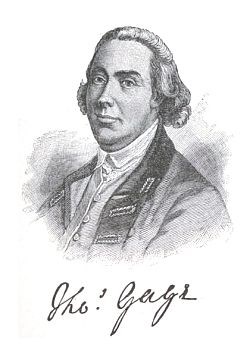
The unfortunate measures of April, 1774, were not carried through Parliament without earnest opposition. Lord Rockingham and his friends entered a protest on the journal of the House of Lords, on the grounds that the people of Massachusetts had not been heard in their own defence, and that the lives and liberties of the citizens were put absolutely into the hands of the governor and council, who were thus invested with greater powers than it had ever been thought wise to entrust to the king and his privy council in Great Britain. They concluded, therefore, that the acts were unconstitutional. The Duke of Richmond could not restrain his burning indignation. “I wish,” said he in the House of Lords, – "I wish from the bottom of my heart that the Americans may resist, and get the better of the forces sent against them.” But that the Americans really would resist, very few people in England believed. The conduct of the ministry was based throughout upon the absurd idea that the Americans could be frightened into submission.
Belief that the Americans would not fightGeneral Gage, as we have seen, thought that four regiments would be enough to settle the whole business. Lord Sandwich said that the Americans were a set of undisciplined cowards, who would take to their heels at the first sound of a cannon. Even Hutchinson, who went over to England about this time, and who ought to have known of what stuff the men of Massachusetts were made, assured the king that they could hardly be expected to resist a regular army. Such blunders, however, need not surprise us when we recollect how, just before the war of secession, the people of the southern and of the northern states made similar mistakes with regard to each other. In 1860, it was commonly said by Southern people that Northern people would submit to anything rather than fight; and in support of this opinion, it was sometimes asked, “If the Northern people are not arrant cowards, why do they never have duels?" On the other hand, it was commonly said at the North that the Southern people, however bravely they might bluster, would never enter upon a war of secession, because it was really much more for their interest to remain in the Federal Union than to secede from it, – an argument which lost sight of one of the commonest facts in human life, that under the influence of strong passion men are unable to take just views of what concerns their own interests. Such examples show how hard it often is for one group of men to understand another group, even when they are all of the same blood and speech, and think alike about most matters that do not touch the particular subject in dispute. Nothing could have been surer, either in 1860, or in 1774, than that the one party to the quarrel was as bold and brave as the other.
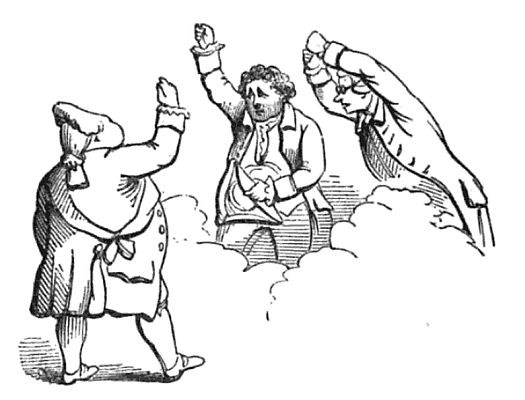
FOX AND BURKE DENOUNCING LORD NORTH
(A contemporary caricature)
Belief that Massachusetts would not be supported by the other colonies
Another fatal error under which the ministry laboured was the belief that Massachusetts would not be supported by the other colonies. Their mistake was not unlike that which ruined the plans of Napoleon III., when he declared war upon Prussia in 1870. There was no denying the fact of strong jealousies among the American colonies in 1774, as there was no denying the fact of strong jealousies between the northern and southern German states in 1870. But the circumstances under which Napoleon III. made war on Prussia happened to be such as to enlist all the German states in the common cause with her. And so it was with the war of George III. against Massachusetts. As soon as the charter of that colony was annulled, all the other colonies felt that their liberties were in jeopardy; and thence, as Fox truly said, “all were taught to consider the town of Boston as suffering in the common cause.”
News of the Port BillNews of the Boston Port Bill was received in America on the 10th of May. On the 12th the committees of several Massachusetts towns held a convention at Faneuil Hall, and adopted a circular letter, prepared by Samuel Adams, to be sent to all the other colonies, asking for their sympathy and coöperation. The response was prompt and emphatic. In the course of the summer, conventions were held in nearly all the colonies, declaring that Boston should be regarded as “suffering in the common cause.” The obnoxious acts of Parliament were printed on paper with deep black borders, and in some towns were publicly burned by the common hangman. Droves of cattle and flocks of sheep, cartloads of wheat and maize, kitchen vegetables and fruit, barrels of sugar, quintals of dried fish, provisions of every sort, were sent overland as free gifts to the people of the devoted city, even the distant rice-swamps of South Carolina contributing their share. The over-cautious Franklin had written from London, suggesting that perhaps it might be best, after all, for Massachusetts to indemnify the East India Company; but Gadsden, with a sounder sense of the political position, sent word, “Don’t pay for an ounce of the damned tea.” Throughout the greater part of the country the 1st of June was kept as a day of fasting and prayer; bells were muffled and tolled in the principal churches; ships in the harbours put their flags at half-mast. Marblehead, which was appointed to supersede Boston as port of entry, immediately invited the merchants of Boston to use its wharfs and warehouses free of charge in shipping and unshipping their goods. A policy of absolute non-importation was advocated by many of the colonies, though Pennsylvania, under the influence of Dickinson, still vainly cherishing hopes of reconciliation, hung back, and advised that the tea should be paid for. As usual, the warmest sympathy with New England came from Virginia. “If need be,” said Washington, “I will raise one thousand men, subsist them at my own expense, and march myself at their head for the relief of Boston.”
To insure concerted action on the part of the whole country, something more was required than these general expressions and acts of sympathy. The proposal for a Continental Congress came first from the Sons of Liberty in New York; it was immediately taken up by the members of the Virginia House of Burgesses, sitting in convention at the Raleigh tavern, after the governor had dissolved them as a legislature; and Massachusetts was invited to appoint the time and place for the meeting of the Congress. On the 7th of June the Massachusetts assembly was convened at Salem by General Gage, in conformity with the provisions of the Port Bill.
Samuel Adams at SalemSamuel Adams always preferred to use the ordinary means of transacting public business so long as they were of avail, and he naturally wished to have the act appointing a Continental Congress passed by the assembly. But this was not easy to bring about, for upon the first hint that any such business was to come up the governor would be sure to dissolve the assembly. In such case it would be necessary for the committees of correspondence throughout Massachusetts to hold a convention for the purpose of appointing the time and place for the Congress and of electing delegates to attend it. But Adams preferred to have these matters decided in regular legislative session, and he carried his point. Having talked privately with several of the members, at last on the 17th of June – a day which a twelvemonth hence was to become so famous – the favourable moment came. Having had the door locked, he introduced his resolves, appointing five delegates to confer with duly appointed delegates from the other colonies, in a Continental Congress at Philadelphia on the 1st of September next. Some of the members, astonished and frightened, sought to pass out; and as the doorkeeper seemed uneasy at assuming so much responsibility, Samuel Adams relieved him of it by taking the key from the door and putting it into his own pocket, whereupon the business of the assembly went on. Soon one of the Tory members pretended to be very sick, and being allowed to go out, made all haste to Governor Gage, who instantly drew up his writ dissolving the assembly, and sent his secretary with it. When the secretary got there, he found the door locked, and as nobody would let him in or pay any attention to him, he was obliged to content himself with reading the writ, in a loud voice, to the crowd which had assembled on the stairs. The assembly meanwhile passed the resolves by 117 to 12, elected Samuel and John Adams, Thomas Cushing, and Robert Treat Paine as delegates, assessed the towns in the commonwealth for the necessary expenses, passed measures for the relief of Boston, and adjourned sine die. All the other colonies except Georgia, in the course of the summer, accepted the invitation, and chose delegates, either through their assemblies or through special conventions. Georgia sent no delegates, but promised to adopt any course of action that should be determined upon.
Massachusetts nullifies the Regulating ActBefore the time appointed for the Congress, Massachusetts had set the Regulating Act at defiance. On the 16th of August, when the court assembled at Great Barrington, a vast multitude of farmers surrounded the court house and forbade the judges to transact any business. Two or three of the councillors newly appointed on the king’s writ of mandamus yielded in advance to public opinion, and refused to take their places. Those who accepted were forced to resign. At Worcester 2,000 men assembled on the common, and compelled Timothy Paine to make his resignation in writing. The councillor appointed from Bridgewater was a deacon; when he read the psalm the congregation refused to sing. In Plymouth one of the most honoured citizens, George Watson, accepted a place on the council; as he took his seat in church on the following Sunday, the people got up and began to walk out of the house. Overcome with shame, for a moment his venerable gray head sank upon the pew before him; then he rose up and vowed that he would resign. In Boston the justices and barristers took their accustomed places in the court house, but no one could be found to serve as juror in a court that was illegally constituted. Gage issued a proclamation warning all persons against attending town meeting, but no one heeded him, and town meetings were more fully attended than ever. He threatened to send an armed force against Worcester, but the people there replied that he would do so at his peril, and forthwith began to collect powder and ball. At Salem the people walked to the town house under the governor’s nose and in the very presence of a line of soldiers. On the 1st of September a party of soldiers seized two hundred kegs of powder at Charlestown and two field-pieces at Cambridge, and carried them to Castle William. As the news spread about the country, rumour added that the troops had fired upon the people, and within forty-eight hours at least 20,000 men were marching on Boston; but they turned back to their homes on receiving word from the Boston committee that their aid was not yet needed.

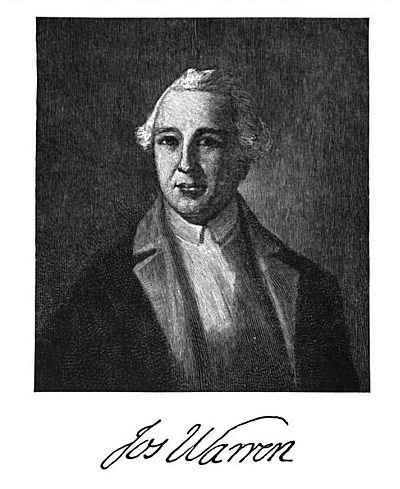
During these stirring events, in the absence of Samuel Adams, who had gone to attend the Congress at Philadelphia, the most active part in the direction of affairs at Boston was taken by Dr. Joseph Warren. This gentleman – one of a family which has produced three very eminent physicians – was graduated at Harvard College in 1759. He had early attracted the attention of Samuel Adams, had come to be one of his dearest friends, and had been concerned with him in nearly all of his public acts of the past seven years. He was a man of knightly bravery and courtesy, and his energy and fertility of mind were equalled only by his rare sweetness and modesty. With Adams and Hancock, he made up the great Massachusetts triumvirate of Revolutionary leaders. The accession of Hancock to the Revolutionary cause at an early period had been of great help, by reason of his wealth and social influence. Hancock was graduated at Harvard College in 1754. He was a gentleman of refinement and grace, but neither for grasp of intelligence nor for strength of character can he be compared with Adams or with Warren. His chief weakness was personal vanity, but he was generous and loyal, and under the influence of the iron-willed Adams was capable of good things. Upon Warren, more than any one else, however, Adams relied as a lieutenant, who, under any circumstances whatever, would be sure to prove equal to the occasion.
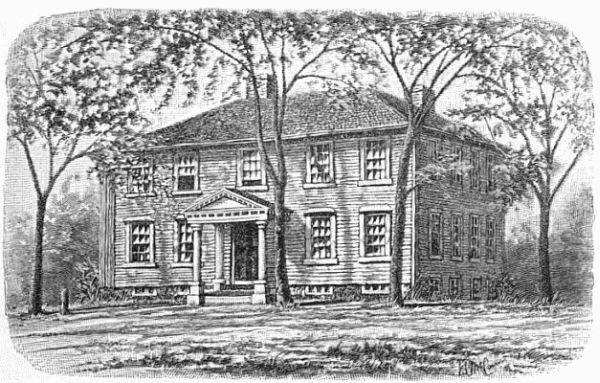
SUFFOLK RESOLVES HOUSE AT MILTON

NOTICE OF THE COMMITTEE OF CORRESPONDENCE
See Transcription
The Suffolk County Resolves, Sept. 6, 1774
On the 5th of September Gage began fortifying Boston Neck, so as to close the only approach to the city by land. Next day the county assize was to be held at Worcester; but 5,000 armed men, drawn up in regular military array, lined each side of the main street, and the unconstitutionally appointed judges were forbidden to take their seats. On the same day a convention of the towns of Suffolk county was held at Milton, and a series of resolutions, drawn up by Dr. Warren, were adopted unanimously. The resolutions declared that a king who violates the chartered rights of his people forfeits their allegiance; they declared the Regulating Act null and void and ordered all the officers appointed under it to resign their offices at once; they directed the collectors of taxes to refuse to pay over money to Gage’s treasurer; they advised the towns to choose their own militia officers; and they threatened the governor that, should he venture to arrest any one for political reasons, they would retaliate by seizing upon the Crown officers as hostages. A copy of these resolutions, which virtually placed Massachusetts in an attitude of rebellion, was forwarded to the Continental Congress, which enthusiastically indorsed them, and pledged the faith of all the other colonies that they would aid Massachusetts in case armed resistance should become inevitable, while at the same time they urged that a policy of moderation should be preserved, and that Great Britain should be left to fire the first shot.







